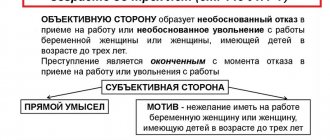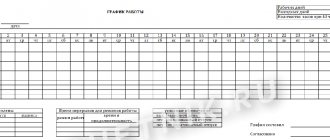Labor legislation is not a category of law that can be ignored without consequences. In this article we will tell you what to do if management still displays destructive behavior while ignoring the rights of employees. Violation of labor laws is a serious problem. Many employees do not know how to act to protect their interests. Especially if problems arise that are much more serious than a one-time delay in salary for a couple of days. Here we have tried to consider the most current topics that allow us to deal with employers who violate the rights of their employees.
Incorrect familiarization of the future employee with local regulations
In accordance with Part 3 of Article 68 of the Labor Code, the employee must be familiarized with the internal regulations of employers before he signs an employment contract . However, in practice, everything usually happens the other way around.
At the same time, liability for this violation is established under Part 1 of Article 5.27 of the Code of Administrative Offences. The fine for officials and individual entrepreneurs will be 1-5 thousand rubles , for legal entities - 30-50 thousand rubles.
It should be
Before signing an agreement with the employer, the employee must be familiarized with local regulations against signature. There are the following methods for this:
- The employee gets acquainted with the acts and puts his signature in a special familiarization journal or on a familiarization sheet.
- The employee puts his signature under the text of each LNA . In this case, it will be clear which text he has read.
- The text of the familiarization sheet is included in the employment contract .
In practice, all these methods are used, but the latter is not without its flaws. After all, the law requires that a person first familiarize himself with internal regulations, and only then sign an employment contract.
Why is it important? In the event of disputes, the courts will necessarily establish the fact that the employee has familiarized himself with local acts. For example, an employee violated discipline. However, he can only be held accountable if he was familiar with the LNA. If the employer does not prove this, the employee will avoid liability.
What to do
Check whether you have accepted the mandatory LNA for all employers :
- internal labor regulations;
- local acts on remuneration, personal data protection, labor protection.
Make sure that when hiring employees, they first sign on the familiarization sheet, in the familiarization log, or directly under the local act. And only after that they sign an employment contract.
Violations of the contract by the employee
An employee who violates an employment contract, in certain cases, risks immediately losing his job. Let's look at them first.
Question: Is non-payment of a bonus a violation of labor laws if the employment contract states that wages consist of an official salary and a bonus? View answer
Can I be fired immediately?
In Art. 81 of the Labor Code of the Russian Federation, paragraph 6, contains a list of violations for which liability may occur immediately. The administration may terminate the employment relationship with an employee without waiting for him to violate the employment contract again:
- Disclosure of secrets related to the performance of work duties. Here we are talking not only about commercial and official secrets, but also about the disclosure of personal data to third parties. The fact of disclosure must be documented by explanatory notes, memos from other employees, video surveillance data and other legitimate information. In addition, an explanation from the violator himself or a corresponding act in case of refusal to provide it is necessary.
- Truancy. Absenteeism is considered to be a situation when an employee is absent from work for the entire working day, shift, or is absent for more than 4 hours in a row without good reason. Judges recognize as valid reasons a strike, arrest, force majeure circumstances beyond the control of the employee (for example, unsatisfactory performance of a transport company), termination of work after a long delay in wages (more than 15 days, after a written warning to the administration), issued sick leave and a number of others. Written evidence of the offense and a written explanation from the offender will also be required.
- Drunk at work. There is a peculiarity here - the courts certainly take into account only the medical report, from which it follows that the employee was drunk. If he refuses to undergo an examination, evidence may include employee testimony, a video indicating that the employee behaved inappropriately at work. In this case, we are talking not only about alcohol intoxication, but also about its other varieties, for example, drugs. A drunk person must be immediately removed from work.
- Property violations: theft, embezzlement, damage, intentional destruction of company property. Here, the employer delegates the authority to establish the truth to the competent authorities and does not independently collect evidence. This case is quite ambiguous from the point of view of judicial practice. Thus, dismissal may be considered illegal if there was an amnesty in the case, a confession (this circumstance is not in itself evidence of guilt), etc.
- Violation of labor safety standards with grave consequences or the threat thereof.
Note! If an employee violated the rules for working with classified information, but it did not become available to third parties, his dismissal will be illegal. At the same time, the use of other, less severe disciplinary sanctions is acceptable.
Question: Is it possible to recognize labor costs for income tax purposes if the written form of the employment contract is not complied with (Clause 1, Article 252, Article 255 of the Tax Code of the Russian Federation)? View answer
What is the responsibility of the employee and employer for violation of the terms of the employment contract ?
It is important to install here:
- the employee’s real guilt in violations;
- real serious consequences or their threat;
- connection of actions with consequences.
Guilt is established at the enterprise according to a special procedure (Article 227 of the Labor Code of the Russian Federation et seq.) by a special commission, an employee of the occupational safety service in its composition.
In addition, dismissal may follow in the following cases:
- Forgery of documents. If, for the purpose of deception, a citizen provided a false diploma, work book, or other documents when applying for a job, he may be fired without being given another job (clause 11).
- The employee does not fulfill his duties under the employment contract without good reason, has been repeatedly found guilty of negligence and has already received a disciplinary sanction (clause 5).
- Inconsistency with position and qualifications (clause 3).
Special grounds
Further pp. 7-10 of the same article contain a number of additional serious grounds on which an employment contract may be terminated. They apply to certain categories of employees:
- Loss of trust of financially responsible persons. If an employee directly deals with inventory or cash and, as a result of his questionable actions, has lost the trust of the administration, he may be fired. Dismissal makes sense only if an agreement on full financial responsibility has been concluded with the employee. Judicial practice recognizes bribery as a sufficient reason for dismissal, if the fact is established by law.
- An official who violates anti-corruption legislation (for example, does not provide information about income or provides incomplete information) risks losing his job.
- Immoral act. This point concerns teaching staff. Physical or moral humiliation of students, humiliation of parents in the presence of a child, or insult of a colleague can be recognized as immoral acts.
- The managers of a company can be fired for making unfounded decisions, as a result of which real material damage was caused to the company (for example, salary increases when the financial condition of the company is unfavorable, concluding contracts with obviously unreliable partners). Here the connection between the damage and the wrongful decision of one person must be proven.
- One-time gross violation of duties by a manager. The legislation does not contain an exhaustive list of such violations. As a rule, the final decision rests with the judges, and evidence of correctness is provided by the employer (for example: negligence in the duties outlined in the employment contract, which resulted in serious material losses, loss of health of employees; signing an order to hire fictitious workers).
In addition, the manager and deputies, the chief accountant may be fired when the owner of the organization’s property changes (clause 4).
Absence of a place of work in the contract
Do you know what a place of work ? Part 2 of Article 57 of the Labor Code of the Russian Federation requires the presence of such a condition in the employment contract. But what is meant by it is not explained in the Code. Only the following is indicated: if the organization has branches at other addresses, and the employee will work in one of them, then a specific unit and its address are indicated as the place of work. What if there is no division?
Despite the consonance, the place of work is not identical to the workplace . This follows from the interpretation of Part 4 of Article 57 and Article 209 of the Labor Code of the Russian Federation. In accordance with the latest standard, the workplace is the place where the employee must be while carrying out his work under the supervision of the employer.
Many people believe that the place of work is the name of the organization. However, this is also not entirely true. You cannot indicate Romashka LLC as your place of work, because this is the name of the employer , that is, independent information that must be present in the employment contract without fail.
It should be
So what is a place of work? The Supreme Court, in its review dated February 26, 2014, reports that the place of work is understood as a specific organization, its branch, representative office or other structural unit located in a certain locality.
Since there is an indication of a specific locality, it is advisable to register as the place of work, for example, “Limited Liability Company “Romashka” (LLC “Romashka”), Moscow.” If an employee is hired by a branch, his name and address must be indicated as his place of work.
What to do
Check how the employee’s employment contract indicates his place of work. If necessary, this provision must be changed by drawing up an additional agreement.
Work without a contract
This applies to those entrepreneurs who hire employees without drawing up an employment contract or contract. Unfortunately, this practice is still common. This is especially true for novice entrepreneurs, for whom every penny counts. If you hire at least one employee, you will need to pay taxes, pensions and insurance contributions for him... And if you periodically attract remote workers (programmer, designer, copywriter and others) - you also need to conclude a civil contract or a contract with them . In addition, the contract must indicate the employee’s working conditions, and a second copy must be handed over to the person.
Does everyone do this, tell me honestly? It’s expensive and tedious, but it’s necessary, and there’s nothing you can do about it.
What are we risking?
An offended employee can contact the labor inspectorate or complain to the tax office. And hello, checks and fines! Failure to formalize an employment or civil law contract or its incorrect execution is punishable by an administrative fine. Officials will pay from 10 to 20 thousand rubles, legal entities will be unlucky - the fine ranges from 50 to 100 thousand.
Lack of working conditions in the workplace
One of the mandatory provisions of an employment contract is the clause on working conditions in the workplace. From January 1, 2014, this requires a special assessment of working conditions. It is allowed not to carry it out only if workplace certification was carried out before the beginning of 2014, but no more than five years ago.
If the contract was concluded after January 1, 2014, it must contain working conditions. If there are no such provisions, then the employer may be fined under Part 4 of Article 5.27 of the Administrative Code.
At the same time, it is unacceptable to prescribe working conditions in a contract without conducting a special assessment . What to do if it was not carried out? The Ministry of Labor advises to indicate general characteristics of working conditions. However, this will not exempt the employer from punishment for violating labor laws when the inspection comes. If the certification of workplaces is overdue, and a special assessment has not yet been carried out, then it must be carried out as soon as possible .
It should be
The working conditions must be specified in the contract in accordance with the classification of Law No. 426-FZ . It implies 4 classes of conditions:
- class 1 - optimal;
- class 2 - acceptable;
- class 3 - harmful;
- class 4 - dangerous.
Example: “Working conditions at the workplace are acceptable working conditions (2nd class), which is confirmed by the report on a special assessment of working conditions, approved on 02/15/2016.”
If the employer later has new vacancies, in accordance with Article 17 of Law No. 426, an unscheduled special assessment of working conditions . It must be carried out within 12 months from the date of organization of workplaces.
Criminal liability.
Oddly enough, violations of labor laws may also result in criminal liability. Its objectives are to protect human rights and freedoms, property from criminal attacks, ensure the safety of humanity, and also prevent crimes.
Only individuals, that is, managers and other officials of the organization, are subject to criminal liability.
Criminal liability arises for the commission of a crime - a socially dangerous act committed guilty of guilt, prohibited by the Criminal Code of the Russian Federation under threat of punishment. Depending on the nature and degree of public danger, crimes are of minor gravity (the maximum punishment does not exceed three years of imprisonment), crimes of moderate gravity (the maximum punishment does not exceed five years of imprisonment), serious crimes (the maximum punishment does not exceed ten years) and especially serious crimes. crimes (punishment period – ten years or more).
The Criminal Code of the Russian Federation provides for four articles that name crimes that relate to labor relations and entail criminal liability.
- Article 136 (violation of equality of rights and freedoms of man and citizen);
- Article 143 (violation of labor protection requirements);
- Article 145 (unjustified refusal to hire or unjustified dismissal of a pregnant woman or a woman with children under three years of age);
- Article 145.1 (non-payment of wages, pensions, scholarships, allowances and other payments).
For example, a violation of labor protection requirements committed by a person who is entrusted with the obligation to comply with them, if this entailed, through negligence, the infliction of serious harm to human health, by virtue of Art. 143 of the Criminal Code of the Russian Federation may entail:
- a fine of up to 400,000 rubles. or in the amount of wages or other income of the convicted person for a period of up to 18 months or compulsory work for a period of 180 to 240 hours;
- corrective labor for up to two years or forced labor for up to one year;
- imprisonment for a term of up to a year with or without deprivation of the right to hold certain positions or engage in certain activities for a term of up to one year.
In this case, liability under Art. 143 of the Criminal Code of the Russian Federation may be borne by persons who, by virtue of their official position or by special order, are directly charged with the obligation to ensure compliance with the rules and regulations of labor protection in a certain area of work, as well as heads of enterprises and organizations, their deputies, chief engineers, chief specialists of enterprises, if they did not take measures to eliminate violations of labor safety rules known to them, or gave instructions that contradict these rules, or, having taken on direct management of certain types of work, did not ensure compliance with the same rules.
Lack of T-2 cards
Decree of the Government of the Russian Federation dated April 16, 2003 No. 225 requires that a personal T-2 card . Any entry in the employee’s work book should be familiarized with signature on this card. It states the same thing as in the work book.
If there is no such card or there are no employee signatures on it, then this is a violation.
What to do
Check if there are personal T-2 cards for each employee. If not, they need to be registered. Indicate as the date of compilation the day when this violation was corrected.
Briefing and medical examinations
A fine of 50 thousand rubles can await both those who neglect medical examinations and those who do not follow the necessary formalities (Part 1 of Article 5.27 of the Code of Administrative Offenses of the Russian Federation).
For example, an employer was fined for allowing drivers to work without pre-trip medical examinations (decision of the Moscow City Court dated July 18, 2019 No. 7-7127/2019, 7-7207/2019, 7-7210/2019, 7-7126/2019, 7- 7154/2019). By the same decision, the Moscow City Court found it lawful to impose a fine on the company for the fact that it had carelessly prepared logs about employees undergoing initial training. In particular, she did not enter data on the date of admission of the employee to independent work and the internship period.
The “five day rule” has been broken
A work book must be issued for employees who have worked for more than 5 days . This is stated in Part 3 of Article 66 of the Labor Code of the Russian Federation. You need to make an entry into the employment record no earlier than the sixth day of work. Moreover, in column 2 you need to indicate not the current date, but the day of hiring.
Sometimes personnel officers forget about the “five-day rule” and draw up a work book too early. In other cases, they neglect this rule, because anyway, column 2 indicates the date of hiring. So what difference does it make when exactly the recording was made? At first glance, this is true. However, different situations are possible.
For example, an employee hired for a probationary period decided to quit on the first day. During the probationary period, you can quit by notifying the employer not 2 weeks in advance, but only 3 days in advance . In this case, the work book is issued without any entries . And if you rushed to make an appointment, then this rule will be violated. That is why it is important to withstand the 5 days stipulated by law.
What to do
When hiring workers, you should comply with the requirement of Article 66 of the Labor Code and make an entry in the work book of the new employee on the sixth or seventh day of his work.
Monetary irregularities
Inspectors check the timeliness of payments and the correctness of deductions. If the inspectors identify deductions that are not named in Art. 137 of the Labor Code of the Russian Federation, and the employer is unable to present a document confirming the employee’s consent to such withholding, the company will face a fine (decision of the Perm Regional Court dated September 19, 2019 in case No. 7-1997/2019(21-1164)).
Another basis for a fine is the compensation that the employer must accrue to the employee if he did not pay the money on time (Article 236 of the Labor Code of the Russian Federation). If such compensation is not paid on time, the company may also be fined 50 thousand rubles (Part 6 of Article 5.27 of the Code of Administrative Offenses of the Russian Federation). And it doesn’t matter what kind of money was not paid on time: salary, payment upon dismissal, or something else (decisions of the Moscow City Court dated July 22, 2019 No. 7-8240/2019, 7-8244/2019, 7-8245/2019 and No. 7-8241/2019, 7-8243/2019, Perm Regional Court dated September 19, 2019 in case No. 7-1997/2019(21-1164) and dated September 18, 2019 in case No. 7-1995/2019(21-1162) ).
Incorrect accounting of work records
In accordance with paragraph 41 of Government Decree No. 225 dated April 16, 2003 , work book forms must be taken into account in the receipt and expenditure book of forms and the work book movement book. These books must be numbered, stitched, certified by the seal of the head and sealed with a wax seal. If the books are not decorated in this way, then this is a violation for which administrative liability follows.
In practice, the books mentioned often lack seals or wax seals.
It should be
Today, few people use wax seals because it is inconvenient. As for sealing, any sealing device in accordance with GOST 31282-2004 is suitable. Experts recommend using film fillings. But paper seals (stickers) cannot be used - the standard that allowed them is no longer valid.
What to do
It is necessary to check the maintenance of books on the accounting of work record forms. The threads with which they are stitched must be sealed with a seal or wax seal.
Mistakes during dismissal
Mistakes in dismissing employees can also be a reason for a fine of 100 thousand rubles. But here the employer has a chance to avoid liability.
Judicial practice is based on the rule: if a mistake in dismissal or disciplinary action becomes a reason for a labor dispute (i.e. the employee does not agree with the fact of the violation, the procedure for dismissal, etc.), then the court considers such disputes according to the rules of Civil Procedure code. Such errors do not entail administrative liability for the employer (decision of the Magadan Regional Court dated 05/06/2019 in case No. 12-78/2019, 7-25/2019, Resolutions of the Supreme Court of the Russian Federation dated 09/13/2019 No. 19-AD19-6 and dated 18.01. 2019 in case No. 19-AD18-32).
But this does not mean that you can draw up dismissal documents carelessly. After all, if a mistake does not lead to an individual labor dispute, it may well result in a fine of 100 thousand rubles for the company.
Thus, the court approved a fine for the employer due to the fact that he “early” (without waiting two weeks from the date of filing the application) issued an order to dismiss the employee. The employee did not contest her dismissal, which enabled the Labor Inspectorate to issue a fine. In addition, the company was made aware that it had sent the employee a notice of the need to come for a work book or agree to receive it by mail not on the day of dismissal, but later (decision of the Trans-Baikal Regional Court dated 02/25/2019 in case No. 7-21-90 /2019).
Violations related to the provision of vacations
An employee has the right to take 28 days of paid vacation annually. It is provided in accordance with the schedule , which the employer approves no later than two weeks before the end of the previous year.
It has become a common practice to provide vacation not entirely, but in parts . However, this procedure requires the prior consent of the employee. If it is not there, then in accordance with Part 1 of Article 125 of the Labor Code of the Russian Federation, this is a violation. In addition, one part of the vacation cannot be less than 14 calendar days .
What to do
To legally share vacation time, an employer should:
- Obtain the employee's consent. Towards the end of the year, receive an application from each employee next year's vacation
- Ensure that one part of the vacation is at least 14 calendar days.
2 weeks before the start of vacation, which is provided according to the schedule, the employee must be notified of its start . The employee himself does not have to submit an application. On the contrary, it is the employer who draws up the written notice. This could be a personal notice for each employee, introductory sheets, or a general statement. In addition, you can take the T-7 and supplement it with two columns. The employee will sign one and put the notification date on the other.
Violation of deadlines
Employers are also fined for failure to comply with the deadlines established by the Labor Code of the Russian Federation. Most often we are talking about vacations and vacation pay. The employer must notify the employee about the vacation two weeks in advance (Article 123 of the Labor Code of the Russian Federation) and pay vacation pay three days in advance (Article 136 of the Labor Code of the Russian Federation).
Often, companies violate these deadlines not through their own fault, but because they accommodated an employee who applied for leave less than three days before. But the judges are convinced that this does not relieve the employer from liability (decisions of the Moscow City Court dated April 18, 2019 in case No. 7-4171/2019 and the Perm Regional Court dated September 16, 2019 in case No. 7-1930/2019/21-1120/2019 ).
So, when signing such an application for leave from an employee, you need to take into account that it threatens fines for the company and the manager personally.





